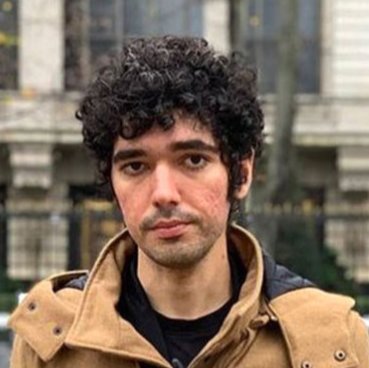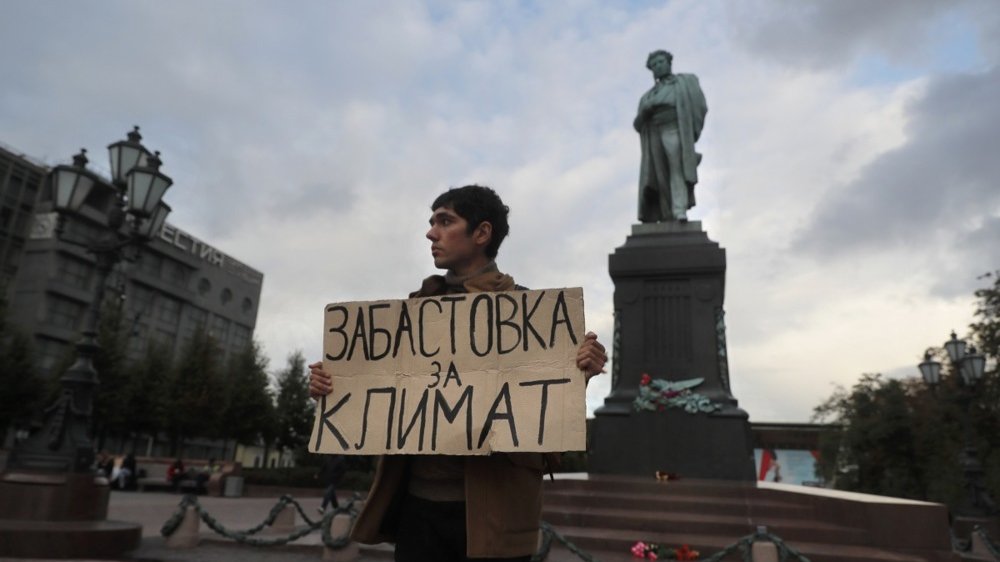In Russia, there are different words for every kind of non-Russian. Armenians are often referred to as black, even though my skin colour doesn’t differ much from that of the majority of the population. After the other kids were mean to me on my very first day at nursery school, I refused to go back. But when I was old enough to go to school, it wasn’t quite that easy — I couldn’t just not go.

Arshak Makichyan
climate and anti-war activist
I had started to make friends and was finally feeling happy when I noticed my friends were hanging around with a group of skinheads I was terrified of. I remember going up to talk to my friend Igor, and him simply ignoring me. We were seven. They didn’t beat me up, at least.
Later, I became a professional musician and attended a music school which was a very different experience from my early school days. My life revolved around music until I learnt about the climate crisis and realised that unless Russia, the largest country in the world by area and fourth largest by emissions, tackled the climate crisis, there was little chance the rest of the world would be able to.
Back then, I thought things weren’t all that bad and dismissed my experiences as casual racism. I went to climate change rallies, talked about what needed to change, about obvious things that everyone seemed to accept.
But instead of accepting me and thanking me for pushing for progress, the comments under my interviews and public appearances focused on telling me to go back to wherever I came from. I ignored the insults, thinking it would be best just to rise above it all.
Civil society didn’t warm to me either. I once wrote to an opposition politician and asked him to support our movement and protests. He replied that while climate change was important, Russia wasn’t ready to address it. This was one of the people who constantly spoke so passionately about Russia’s brilliant future.
We created the first Russian climate movement all by ourselves. But the media only wrote about us when there were crackdowns. One time, a guy who didn’t look ethnically Russian threatened to stab me at a protest. They wanted to stop me protesting, but didn’t want an international incident. They were afraid of a Russian climate activist becoming well-known. They didn’t want a Russian Greta Thunberg. The person who threatened me wasn’t Russian, but that’s normally how it works. Ethnic Russians never do the dirty work in Russia.
The police most likely threatened to deport him unless he attacked me. I don’t blame him for what he did, but I filed a police report anyway. Nothing happened, even though I had concrete evidence: a video recording, which gained media attention.
If I had been ethnically Russian, other Russians would have been outraged. They would have been appalled that a migrant had dared pose a threat to a fellow Russian. But they felt no sympathy for me.
We also made headlines when I was arrested for six days. They didn’t name me in headlines though, and just referred to me as an activist in the Greta Thunberg movement. Nobody commented on Thunberg’s nationality. She’s white. She gets called other things.
Then the pandemic happened and Russia became more and more repressive. It was more than just an increase in xenophobia. Everyone was being targeted. There was war, an imperialist war. Ukrainians in Russia are referred to pejoratively as “khokhols”. Even if they’re Russian citizens with Ukrainian roots, they’re still “khokhols”. Don’t try and wrap your head around it. It makes as little sense as Putin’s maps.
When I saw Putin’s maps, I jokingly decided to look at some old Armenian ones. Russia wasn’t on the map at all. I jokingly proposed that Armenia annex certain Russian regions. But Russians didn’t like the joke. Insults flooded my comment sections once again. For some reason, many of them were fixated on my hair. What’s so wrong with my curly hair?
While all that was going on, I was stripped of my Russian citizenship. There have been changes in the law and it is now much easier for people who are not ethnically Russian to be stripped of their citizenship and to have their property seized.
It reminded me of the Armenian genocide somehow. It affected my family too, who were deported. History is repeating itself and Armenians are facing deportation once again.
And my comments are flooded with bots, both in Russian and English, telling me to leave Russia and go back to my own country. Well guess what? I have left Russia! I have been banned from entering Russia for 50 years because the FSB thinks I’m a threat to national security.
Despite the hate, I still speak out. In recent months, I have started talking more and more about Russian colonialism. What surprised me most of all is the lack of logic in the rules of this debate. For some reason, people who aren’t ethnic Russians are not allowed to comment on Russia, but when Russia occupies other countries, they don’t see the contradiction.
Those Russians in exile for disagreeing with the establishment all complain about xenophobia towards Russians (so-called Russophobia), but nobody, except ethnic minorities in Russia, talks about xenophobia in Russia. And it’s more than just casual racism. It’s government policy. There are hundreds of different ethnicities living in Russia. Russia is a tapestry of different ethnic groups, rather than a single nation state. But nobody talks about it. And you can forget equal rights.
Everyone is afraid. Especially minorities, which is why they are silent. I was afraid too. If you’re not part of the Russian ethnic majority, fear is your default state.
Engaging in activism becomes even more frightening, even though you are in your own country. Activists are regularly killed in the North Caucasus republics of Chechnya and Dagestan.
In Bashkortostan, in the Volga region, an activist was recently killed in police detention. All three places are separate republics within the Russian Federation with their own culture, history and language, but they all blur into one in the eyes of international media. World leaders usually don’t even acknowledge the existence of a decolonisation movement in Russia. We’re not that important. We don’t have names.
I was lucky. Five years ago Greta Thunberg reposted my tweets. With her following, it was hard to ignore me. But very few people take notice of ethnic minority Russians. The Russian opposition doesn’t support anti-colonial activists like me. Russia isn’t ready for decolonisation, they say. The majority of Russians are ethnically Russian. In their view, freeing the country from Putin should take priority over everything else, and only after that can the country’s remaining problems can be addressed.
So Russian minorities and indigenous people end up without representation anywhere. Nobody is interested. Nobody accepts us. Not the Russians. Not the Europeans. Not even our own people.
But we exist. Even if it’s sometimes hard to breathe. Sometimes you want to be a hero, like Navalny. Perform heroic deeds. Our courage is yet to inspire others, and that’s a shame. But for some reason, they’re still afraid of us, and they kill us.
Views expressed in opinion pieces do not necessarily reflect the position of Novaya Gazeta Europe.
Join us in rebuilding Novaya Gazeta Europe
The Russian government has banned independent media. We were forced to leave our country in order to keep doing our job, telling our readers about what is going on Russia, Ukraine and Europe.
We will continue fighting against warfare and dictatorship. We believe that freedom of speech is the most efficient antidote against tyranny. Support us financially to help us fight for peace and freedom.
By clicking the Support button, you agree to the processing of your personal data.
To cancel a regular donation, please write to [email protected]

